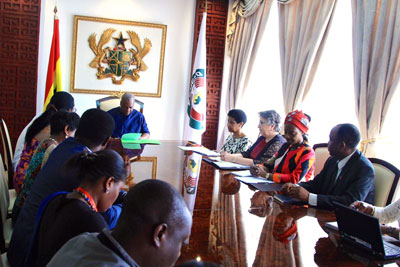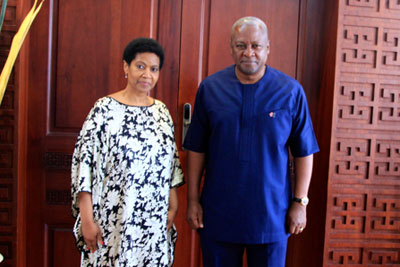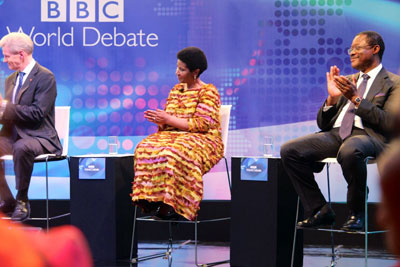UN Women Executive Director calls on stakeholders to “Step It Up” for gender equality to achieve “Planet 50:50 by 2030” in Ghana
Date:
Accra, Ghana- UN Women Executive Director Phumzile Mlambo-Ngcuka paid an official visit to Ghana from 24-26 March, to engage with key stakeholders and participate in the international programme by the British Broadcasting Corporation (BBC) on the theme “Ebola: What next?”. She met with key stakeholders in the capital, Accra, including a high-level meeting with the President of the Republic of Ghana, H.E. John Dramani Mahama, on 25 March.

Throughout the visit, Ms. Mlambo–Ngcuka shared a clear message: “Coming out of the 59th session of the Commission on the Status of Women (CSW) in New York, we know that many countries around the globe and in Africa, including Ghana, have passed laws to advance gender equality and women’s empowerment. However, while laws are passed, we know that women and girls are continuing to suffer great inequality and discriminatory practices. We must fully engage to make our commitments a concrete reality for women, and we know that it is possible,” said Ms. Mlambo-Ngcuka.”
During her meeting with the President of the Republic, the Executive Director mentioned UN Women’s Step It Up campaign and called for renewed commitments on advancing gender equality, while encouraging progress achieved.

“Your arrival in our country could not happen at a better time,” said President Dramani Mahama. “Gender equality is a key priority for the Government of Ghana and we have made progress towards the goals we have set ourselves, thanks to our very active Ministry of Gender,” he said, referring to the draft affirmative action bill prepared by the Ministry of Gender, Children and Social Protection, and validated with civil society. Soon to be presented to Parliament, the bill aims to address gender inequalities and ensure that women are fully included in the decision-making process.
During her meeting with the UN Women Executive Director, the Minister of Gender, Children and Social Protection Nana Oye Lithur said her country is about to “make history” with the bill.
Ms. Mlambo-Ngcuka also met with the United Nations country team and Gender Theme Group, along with the United Nations Resident Coordinator to Ghana, Christine Evans-Klock. “Women should be given a stronger role,” stressed Ismail Ould Cheikh Ahmed, the Special Representative to the UN Secretary-General for the United Nations Mission for Ebola Emergency Response (UNMEER).
Ms. Mlambo-Ngcuka also met with women leaders, including youth, to further discuss progress and challenges in advancing the gender equality agenda in the country.

On 25 March, the UN Women Executive Director took part in a BBC World debate on the topic of “Ebola: What Next?” at the University of Ghana, alongside distinguished panelists including Liberian activist and Nobel Peace prize laureate Lehmah Gbowee.
During the programme, Guinea’s Minister for International Cooperation Koutoub Moustapha Sano said: “We were overwhelmed by the fragility of the health system in our countries and the barriers that culture and tradition pose.”
Ms. Mlambo-Ngcuka emphasized the crucial role for women in the Ebola response, as educators, caregivers and community leaders.
"Women's leadership at all levels in the Ebola response is critical to getting to zero and in the recovery phase. When you effectively include them in the decision-making process you will see change,” she reiterated. “Change will happen."
BBC World Service Radio will air the debate at 3 a.m., 9 a.m. and 7 p.m. GMT on Friday 27 March, while BBC World TV News will broadcast it on Saturday 4 April at 4.10 a.m., 5.10 p.m. and 11.10 p.m. GMT, as well as on Sunday 5 April at 10.10 a.m. GMT.